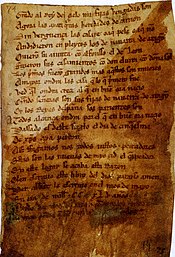Peninsular Spanish

Peninsular Spanish (Template:Lang-es), also known as the Spanish of Spain (Template:Lang-es), European Spanish (Template:Lang-es) and Iberian Spanish (Template:Lang-es), is the set of varieties of the Spanish language spoken on the Iberian Peninsula and outlying islands, as opposed to the Americas and the Canary Islands. The related term Castilian Spanish is often applied to formal varieties of Spanish as spoken in Spain.[1][2] According to folk tradition, the "purest" form of Peninsular Spanish is spoken in the Castilian province of Valladolid, although the concept of "pure" languages has been questioned by modern linguists.[3][4]
Phonologically, the most prominent distinguishing element of Peninsular Spanish, except for the southernmost varieties, is the use of a distinction between the phonemes /s/ and /θ/, represented respectively with the letters ⟨s⟩ on one hand and ⟨z⟩, or ⟨c⟩ before ⟨e / i⟩, on the other. In other varieties, the two phonemes are realized as a single /s/. The distinction is usually simply labelled distinción, while the lack of distinction between the two is called seseo or ceceo, depending on the phonetic outcome ([s] in the former case, [s̟] in the latter).
Morphologically, the most notable distinguishing feature of Peninsular Spanish is the use of the pronoun vosotros (along with its oblique form os) and its corresponding verb forms for the second person plural familiar. In virtually all other varieties of Modern Spanish (with the exception of Equatoguinean Spanish), for the second person plural, the familiar and the formal are merged in ustedes, with its verb forms. Again, the use of vosotros is uncommon in the Canary Islands and only partially introduced in Western Andalusia.
Variants
- Andalusian Spanish
- Castilian Spanish
- Castrapo (Spanish spoken in Galicia, as opposed to the Galician language)
- Castúo
- Catalan Spanish
- Murcian Spanish
References
- ^ "Castilian Spanish". ncl.ac.uk. Retrieved 23 May 2015.
- ^ "Castilian". Webcitation.org. Archived from the original on October 31, 2009. Retrieved 2015-08-11.
- ^ MARCOS, JAVIER RODRÍGUEZ (2011-12-15). ""En ningún sitio se habla el mejor español del mundo"". El País (in Spanish). ISSN 1134-6582. Retrieved 2019-04-01.
- ^ "Lingüista sostiene que no hablan mejor español en Valladolid que en Medellín". La Vanguardia (in Spanish). 2016-09-03. Retrieved 2019-04-01.
External links
- Constraint interaction in Spanish /s/-aspiration: three Peninsular varieties, Richard E. Morris
- Coda obstruents and local constraint conjunction in north-central Peninsular Spanish, Richard E. Morris
- (in Spanish) Jergas de habla hispana Spanish dictionary specializing in slang and colloquial expressions, featuring all Spanish-speaking countries.

